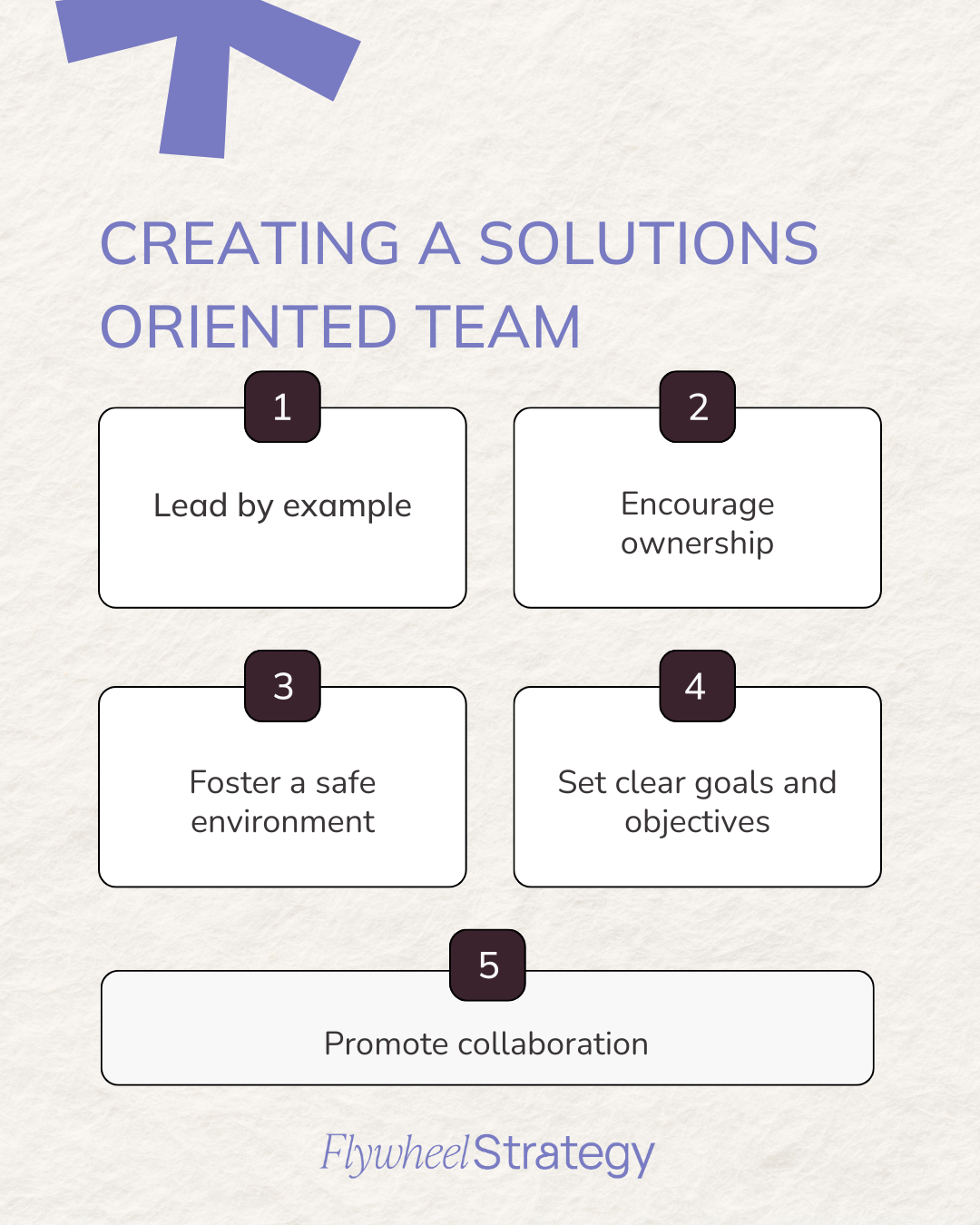WRITTEN BY: KATE MACCABE
Fostering a Problem-Solving Culture: Coaching Your Team to Excellence
In the fast-paced and ever-evolving world of startups, the ability to solve problems swiftly and effectively is essential. While identifying challenges and bottlenecks is a valuable skill, it’s equally important to cultivate a solutions-oriented mindset within your team. As a leader, your role in coaching your team to be proactive problem solvers is pivotal.
Here are our 10 favorite strategies to help teams transition from being problem finders to solution generators.
#1. Lead by Example
Effective leadership begins with modeling the behavior you want to see in your team. Demonstrate a solutions-oriented approach in your own work. When faced with challenges, tackle them head-on and share your thought process with your team. By leading by example, you show your team that finding solutions is not just a responsibility but a mindset.
#2. Encourage Ownership
Empower your team members to take ownership of the problems they encounter. When they feel responsible for finding solutions, they are more likely to engage in creative problem-solving. Encourage them to ask themselves questions like “What can I do to address this issue?” or “How can I contribute to resolving this challenge?”
#3. Foster a Safe Environment
Create a safe and supportive environment where team members feel comfortable proposing ideas and solutions, even if they are unconventional or imperfect. Emphasize that mistakes are opportunities for learning and growth. When your team knows they won’t face criticism for trying to solve problems, they are more likely to take initiative.
#4. Set Clear Goals and Objectives
Ensure that your team understands the overall goals and objectives of your startup. When they have a clear understanding of the big picture, they can align their problem-solving efforts accordingly. Encourage them to see challenges as opportunities to contribute to the broader mission and vision of the company.
#5. Promote Collaboration
Foster a culture of collaboration where team members from different departments or backgrounds can come together to brainstorm solutions. Cross-functional collaboration can bring fresh perspectives and diverse skillsets to the table, leading to more innovative solutions.
#6. Provide Resources and Training
Invest in your team’s skills by providing the necessary resources and training. Equip them with tools, software, and knowledge to enhance their problem-solving capabilities. Encourage continuous learning and development to stay ahead in the ever-changing startup landscape. We find continuous learning in the digital industry can be effective through certification training, local meetups, or industry conferences. Each industry event provides a touch point for your team to expand beyond their current knowledge base and incorporate new thinking into the solutions they create.
#7. Celebrate Small Wins
Recognize and celebrate even the smallest victories. When team members successfully implement a solution, acknowledge their efforts individually, in group settings and with special occasions to highlight the impact it has had on the company. Celebrating wins reinforces the importance of being solutions-oriented.
#8. Implement Feedback Loops
Establish feedback mechanisms where team members can share their ideas and feedback openly. Regular feedback sessions can help identify areas where improvement is needed and can lead to the refinement of problem-solving processes. Make the F word of Feedback a positive and solutions-oriented meaning for your team.
#9. Emphasize Adaptability
In both the start up and technology world, change is constant. Need a reminder of how quick? Here’s a refresher of Moore’s Law which drives the rapid evolution happening in the space. Encourage your team to embrace change and adapt quickly. Being solutions-oriented means being flexible and open to trying new approaches when the old ones don’t work.
10. Measure and Track Progress
Define and visualize key performance indicators (KPIs) to measure the effectiveness of your team’s problem-solving efforts. Regularly review progress and provide constructive feedback. Adjust strategies as necessary to continually improve the team’s ability to find and implement solutions.
In an environment of growth and scale for businesses, being a problem solver is not just a skill; it’s a mindset. As a startup executive, your role in coaching your team to be solutions-oriented is essential for the success and growth of your company. By leading by example, fostering a supportive environment, and emphasizing the importance of ownership and collaboration, you can transform your team into proactive problem solvers who drive innovation and propel your startup forward in a competitive landscape.
Orienting to Solutions is one of the five areas of focus the Flywheel Strategy team provides frameworks, techniques and support for to move your organization squarely into solution-oriented ways of working.

BE THE FIRST TO COMMENT: